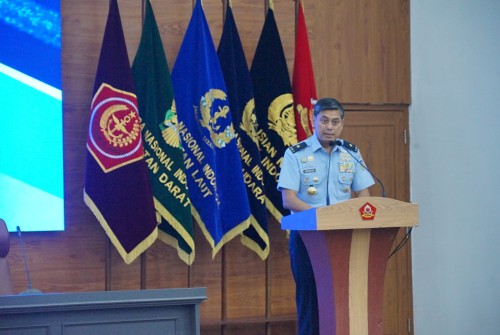- Frequently Asked Questions (FAQ)
- Informasi: 0274-513538 | lldikti5@kemdikbud.go.id

The Rector of the Adisutjipto Institute of Aerospace Technology (ITD Adisutjipto), First Marshal TNI Dr. Ir. Arwin Datumaya Wahyudi Sumari, disclosed the disruptive warfare style at the Indonesian Armed Forces Command and Staff College (Sesko) in Bandung, West Java, on February 28, 2024. The warfare strategy briefing was designed to sharpen the theory and practical skills of Officer Candidates (Pasis) from the Indonesian National Armed Forces (TNI), Indonesian National Police (Polri), and friendly nations.
The learning aims to enhance the quality of advanced technology mastery for Middle Officers of the TNI/Polri, who play a strategic role in national defense and security development. The Rector of ITD Adisutjipto taught the subjects of Electronic and Informatics Technology as well as Network Centric Warfare (NCW). The material was delivered to the Officer Candidates of the 2024 TA TNI Sesko LII Dikreg, comprising 188 Pasis from TNI, Polri, and friendly nations. The provision of this material to the candidates aims to enable them to precisely understand the developments in Electronics and Informatics Technology as guidelines for their duties within the TNI/Polri environment.
There were at least four main topics discussed in the first session. The teaching program included the development of electronic technology, the development of information technology, the relationship between electronic technology, and the function of electronic and information technology in the command and control center of operations. The hope is that the candidates understand the development of Electronic and Informatics Technology accurately as a guide for policy formulation within the TNI environment.
Then, in the second part of the teaching program, Network Centric Warfare (NCW), the Rector of ITD Adisutjipto elaborated on the theories and concepts of network-centric warfare and its application models. It explained what NCW is and how it is applied in the disruptive era, discussing advancements in computing and networking in weapon technology, situational awareness, decentralized decision-making, and Artificial Intelligence.